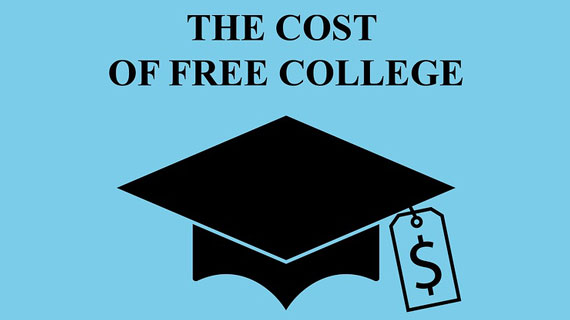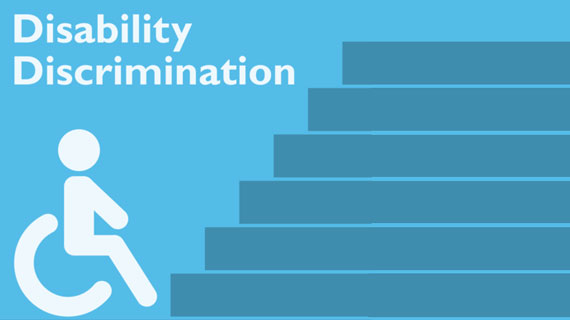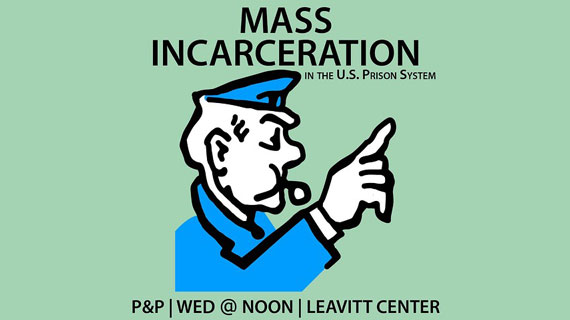The Cost of Free College
Posted: November 15, 2017 | Author: Cami Mathews | Read Time: 4 minutes
 The Michael O. Leavitt Center for Politics and Public Service hosts Pizza & Politics every Wednesday at noon to discuss a current political topic. Leavitt Center student employees research the topic and moderate the conversation. These discussions expose students to a variety of important issues and encourages them to share their own perspectives while learning all sides of an issue. Free pizza is provided for all who attend.
The Michael O. Leavitt Center for Politics and Public Service hosts Pizza & Politics every Wednesday at noon to discuss a current political topic. Leavitt Center student employees research the topic and moderate the conversation. These discussions expose students to a variety of important issues and encourages them to share their own perspectives while learning all sides of an issue. Free pizza is provided for all who attend.This week’s discussion was on tuition and student fees, specifically about the idea of free college. This topic has been popular lately with Senator Bernie Sanders and his proposed legislation for free college across the country.
The discussion, moderated by Kenten Pope, a graduate student in the Master of Professional Communication program, and Morgan Barney, a junior English major with a minor in both Spanish and Legal Studies, started broad with national topics and narrowed down to tuition and student fees at Southern Utah University.
From the research completed by the moderators, average tuition rates for in-state students is $9,650 nationally and $6,301 in Utah. For out-of-state students, it is $24,930 nationally and $18,486 in Utah. From the U.S. Bureau of Labor Statistics, in 2015, median weekly earnings increased with each degree earned, while the unemployment rate decreased. In other words, people are more likely to earn more and less likely to be unemployed if they earn at least a Bachelor’s degree.
Who would benefit most from free college tuition?
The audience gave a few different answers to this question, two of which stuck out the most. The first answer suggested that lower-income students would benefit the most from free college tuition. Arguments given suggested that low-income students, who would not be able to afford college normally, would be given a chance to earn a higher-education degree.
The audience gave a few different answers to this question, two of which stuck out the most. The first answer suggested that lower-income students would benefit the most from free college tuition. Arguments given suggested that low-income students, who would not be able to afford college normally, would be given a chance to earn a higher-education degree.
The other suggestion was that students who attend the most elite colleges would benefit the most. A student attending SUU would save less money, overall, than a student attending Harvard. The thought here is that the benefit of free college is the actual amount paid, as opposed to the experience given to those who would not normally have it.
How would the quality of education change with free tuition?
The answers here were scattered, with people suggesting it would get worse or it would stay the same. No one thought that the quality of education would get better. Students answered that without tuition, there would not be enough money to pay faculty and staff, resulting in most finding other careers. Others suggested that the quality of education would stay the same because the money would appear from other areas, just not from tuition.
The answers here were scattered, with people suggesting it would get worse or it would stay the same. No one thought that the quality of education would get better. Students answered that without tuition, there would not be enough money to pay faculty and staff, resulting in most finding other careers. Others suggested that the quality of education would stay the same because the money would appear from other areas, just not from tuition.
What are your thoughts on higher quality education for a few versus general education for all?
Most people in the audience stated that it is better for the majority of people to receive an education. Some pointed out that the question assumes that free college would mean a lower quality of education. Ideally, everyone would be given a free, high-quality education.
Most people in the audience stated that it is better for the majority of people to receive an education. Some pointed out that the question assumes that free college would mean a lower quality of education. Ideally, everyone would be given a free, high-quality education.
Should tuition-free programs provide assistance to students who have already graduated?
To preface this question, there are a few free tuition examples that are already in place or planning on being in place this next year. Tennessee and Oregon have enforced free community college tuition since 2015, as well as a last-dollar scholarship that covers tuition and fees. New York plans to cover tuition for state residents at CUNY and SUNY with income of $125,000 or lower. Graduates must work in New York for equivalent amount of time studied and are still required to pay student fees.
To preface this question, there are a few free tuition examples that are already in place or planning on being in place this next year. Tennessee and Oregon have enforced free community college tuition since 2015, as well as a last-dollar scholarship that covers tuition and fees. New York plans to cover tuition for state residents at CUNY and SUNY with income of $125,000 or lower. Graduates must work in New York for equivalent amount of time studied and are still required to pay student fees.
In Bernie Sanders’ bill, proposed in April 2017, student debt interest rates would be cut. This would allow those with student debt to get rid of or decrease that amount.
Students in the Pizza & Politics discussion did not mind the idea of getting rid of student debt. Most in the audience felt that if free college were to be implemented, it would be after they graduated from SUU. Students realized that if assistance were provided to those with debt, it would most likely benefit them.
Should student fees be required or optional at SUU?
Moving the conversation to SUU, the answer to the question depended on how involved a student was. Right now, SUU students pay $378.75 a semester in student fees. These fees are distributed to areas like SUUSA and athletics. Students who felt like they were paying too many student fees also stated they rarely attend campus activities. Those who attend all types of events felt that the almost $400 was a reasonable amount to pay.
When it came down to it, the audience was split on the idea of free college. Many felt that taxes would have to increase in order to keep universities afloat, while others felt that was a small price to pay to have an educated population overall.
This article was published more than 3 years ago and might contain outdated information or broken links. As a result, its accuracy cannot be guaranteed.
Tags: Blog Leavitt Center



